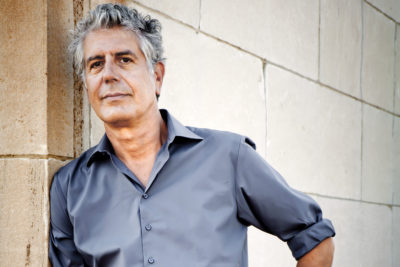Do we all grieve for people we have never met, whose deaths knock us down because of what they have come to represent to us and others? Two or three million Frenchmen and women are said to have come out for Victor Hugo’s funeral procession in Paris in May of 1885. Untold numbers lined the tracks to pay respect to Lincoln’s and FDR’s and Robert Kennedy’s bodies as they passed in their funeral trains. LBJ declared a day of national mourning for Martin Luther King.
 Anthony Bourdain was a chef, a writer and creator of documentaries whose subjects were food, those who make it and serve it and the countries and cultures that produce it. He was profane, irreverent, humble, and endlessly, gloriously curious. In his visits to places most of us will never go, he was the best kind of American representative. He listened to people carefully and asked questions that drew from them stories of their lives that helped us see their humanity. When I watched his show, that is what I kept thinking — he gets it. He understands that word, that neglected, sacred idea in these lurid American months. He got it that humanity had nothing to do with flags, borders, supremacy, exceptionalism, force, arrogance — all those old and blood soaked words. He understood that humanity was all about sharing a meal, speaking with respect for where you have landed and with whom you are breaking bread. He understood the commonality of our ordinary pleasures and pain. He was a mensch. He made me feel hopeful. I felt that as long as he was around and traveling out there far away from the American media bubble, bringing back reports suffused with shared laughter and ordinary grace and civility, then we could find our way out of the mess that now overwhelms us. I gasped aloud when I saw the news of his suicide. I had to sit down. I thought to myself, selfishly, “Oh, not now. Not now.”
Anthony Bourdain was a chef, a writer and creator of documentaries whose subjects were food, those who make it and serve it and the countries and cultures that produce it. He was profane, irreverent, humble, and endlessly, gloriously curious. In his visits to places most of us will never go, he was the best kind of American representative. He listened to people carefully and asked questions that drew from them stories of their lives that helped us see their humanity. When I watched his show, that is what I kept thinking — he gets it. He understands that word, that neglected, sacred idea in these lurid American months. He got it that humanity had nothing to do with flags, borders, supremacy, exceptionalism, force, arrogance — all those old and blood soaked words. He understood that humanity was all about sharing a meal, speaking with respect for where you have landed and with whom you are breaking bread. He understood the commonality of our ordinary pleasures and pain. He was a mensch. He made me feel hopeful. I felt that as long as he was around and traveling out there far away from the American media bubble, bringing back reports suffused with shared laughter and ordinary grace and civility, then we could find our way out of the mess that now overwhelms us. I gasped aloud when I saw the news of his suicide. I had to sit down. I thought to myself, selfishly, “Oh, not now. Not now.”
From this distance I can only assume that his biochemistry turned against him and had done so for some time. I think he was caught within an hour of such emotional pain that hanging himself with the belt of his robe seemed like the only idea that ever existed and it grew into a monumental, all encompassing moment. This is depression as physical weight, as a circumstance of zero sum pain, as a 0 and 1 choice. Nothing will solve the pain except oblivion. This is depression as the darkest trap of an alley one has ever entered. In such a place, anything looks like a source of light, even death. Perhaps if he had been able to escape that moment, in an hour he might have been better. He might have walked out into another sanctuary, temporary but real.
His was a voice that said to me, “We are all in this mayhem of a life together, and so we can at least sit down for a bit, and oh, what is that you’re eating, and yes, please, begin to tell me your story as we fill our plates.” He is irreplaceable and my God, I miss him.